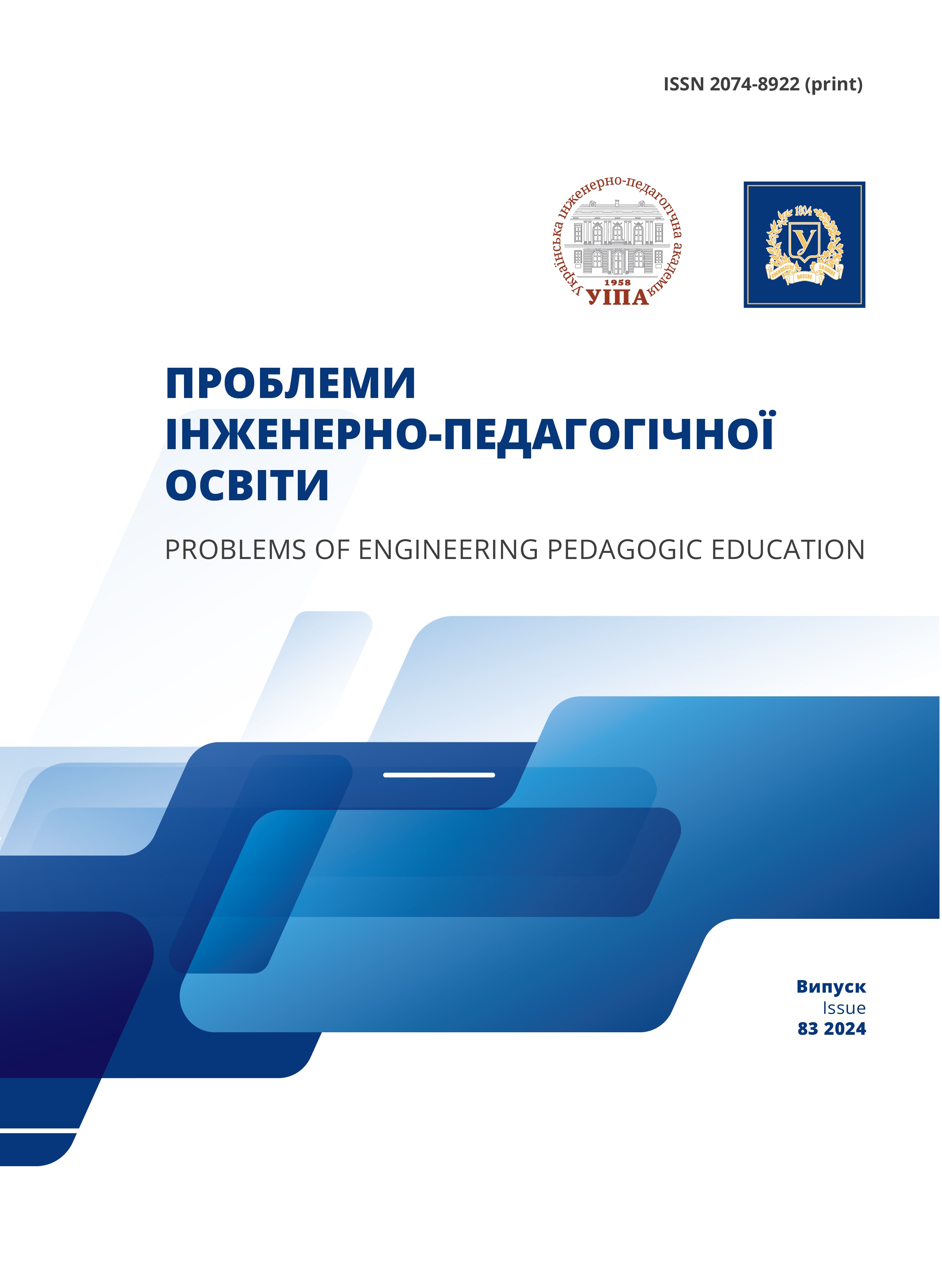TRANSFORMING A FOREIGN LANGUAGE COURSE AT AN ENGINEERING UNIVERSITY INTO A COMPREHENSIVE DISTANCE FORMAT
Abstract
DOI: https://doi.org/10.26565/2074-8922-2024-83-08
The article is devoted to the study of the possibilities and effectiveness of using distance learning and information and communication technologies (ICT) in the process of teaching foreign languages in higher education institutions. The paper examines in detail various forms of distance learning, including webinars, practical online seminars, interactive tasks on educational platforms, thematic discussions, group projects, virtual language clubs, and excursions. The advantages of using such technologies for the development of all types of speech activities (speaking, listening, reading, writing) and the formation of students' communicative competence are described. Particular attention is paid to the analysis of educational platforms (Moodle, Google Classroom), mobile applications (Duolingo, Memrise), video conferencing (Zoom, Microsoft Teams) and gamification technologies that help to increase student motivation and make the learning process more flexible and accessible.
The article discusses both the positive aspects of distance learning - individualization of the learning process, the ability to work at one's own pace, access to a variety of educational resources and materials - and the limitations, such as the need for a high level of self-organization among students, dependence on a stable technical infrastructure, and difficulties in controlling independent work. The authors offer a number of recommendations for adapting a foreign language course to a distance format and conclude that, given an adequate technical base and competent organization of the educational process, distance technologies can significantly increase the effectiveness of foreign language learning, allowing for the creation of a virtually complete foreign language environment and improving students' practical skills. Thus, distance learning and the use of ICTs open up new horizons for improving foreign language teaching methods in higher education institutions. An important condition for the successful application of these technologies is the continuous professional development of teachers and the integration of the latest educational solutions into the educational process. The authors emphasize that it is the combination of traditional and modern teaching methods that can ensure maximum efficiency and effectiveness of teaching.
In cites: Tupchenko V.V., Pasichnyk M.V. (2024). Transforming a foreign language course at an engineering university into a comprehensive distance format. Problems of Engineering Pedagogic Education, (83), 85-93. https://doi.org/10.26565/2074-8922-2024-83-08
Downloads
References
Blake, Robert (2011). Current Trends in Online Language Learning. Annual Review of Applied Linguistics, 31, 19 - 35. https://doi.org/10.1017/S026719051100002X
Murphy-Judy, K. (2016). Hampel, Regine and Ursula Stickler (2015). Developing Online Language Teaching: Research-Based Pedagogies and Reflective Practices. CALICO Journal, 33(3), 410–414. https://www.academia.edu/83671778/Hampel_Regine_and_Ursula_Stickler_2015_Developing_Online_Language_Teaching_Research_Based_Pedagogies_and_Reflective_Practices
Christopher Lange, Jamie Costley (2015). Opportunities and Lessons from Informal and Non-formal Learning: Applications to Online Environments. American Journal of Educational Research, 3(10), 1330-1336. https://pubs.sciepub.com/education/3/10/20/index.html
Bax, S. (2011). Normalisation Revisited: The Effective Use of Technology in Language Education. International Journal of Computer-Assisted Language Learning and Teaching, (IJCALLT), IGI Global, 1(2), 1-15. https://ideas.repec.org/a/igg/jcallt/v1y2011i2p1-15.html
Godwin-Jones, Robert (2015). Emerging technologies: The evolving roles of language teachers: Trained coders, local researchers, global citizens. Language, Learning and Technology, 19, 10-22. http://llt.msu.edu/issues/february2015/emerging.pdf
Chapelle, C. (2003). English Language Learning and Technology: Lectures on Applied Linguistics in the Age of Information and Communication Technology (Vol. 7). Amsterdam: John Benjamins Publishing. https://doi.org/10.1075/lllt.7
Cheng, L., Myles, J. (2003). Managing the Change from On-Site to Online: Transforming ESL courses for teachers. Open Learning: The Journal of Open, Distance and e-Learning, 18(1), 29–38. https://doi.org/10.1080/0268051032000054103
Ülker, N. (2023). Maintaining quality of higher education during difficult times: Accreditation compliance in foreign language education. Cogent Education, 10(1). https://doi.org/10.1080/2331186X.2023.2167320
Ferri, F., Grifoni, P., Guzzo, T. (2020). Online learning and emergency remote teaching: Opportunities and challenges in emergency situations. Societies, 10, 86. https://doi.org/10.3390/soc10040086
Mellati, M., Khademi, M. (2018). MOOC-based educational program and interaction in distance education: long life mode of teaching. Interactive Learning Environments, 28(8), 1022–1035. https://doi.org/10.1080/10494820.2018.1553188
Ludwig, C., Tassinari, M. G. (2021). Foreign language learner autonomy in online learning environments: the teachers’ perspectives. Innovation in Language Learning and Teaching, 17(2), 217–234. https://doi.org/10.1080/17501229.2021.2012476
Bryntseva O. V. (2021). Monitoring techniques in foreign language learning at engineering universities. Problems of Engineer-Pedagogical Education, 73, 104-110. https://doi.org/10.32820/2074-8922-2021-73-104-110 (in Ukrainian).
García-Peñalvo, F. J., Corell, A., Abella-García, V., Grande, M. (2020). Online assessment in higher education in the time of COVID-19. Educ. Knowl. Soc, 21(open in a new window), 1–12. https://doi.org/10.14201/eks.23086
Cotterall, S. (2000). Promoting Learner Autonomy Through the Curriculum: Principles for Designing Language Courses. ELT Journal, 54(2), 109–117. https://doi.org/10.1093/elt/54.2.109
Trokhymchuk, S., Bryntseva, O., Pasichnyk, M. (2024). Approaches to Foreign Language Teaching of Future Engineer-Teachers in the Context of Digitalization and Distance Learning. In: Auer, M.E., Cukierman, U.R., Vendrell Vidal, E., Tovar Caro, E. (eds) Towards a Hybrid, Flexible and Socially Engaged Higher Education. ICL 2023. Lecture Notes in Networks and Systems, vol 900. Springer, Cham. https://doi.org/10.1007/978-3-031-52667-1_7

